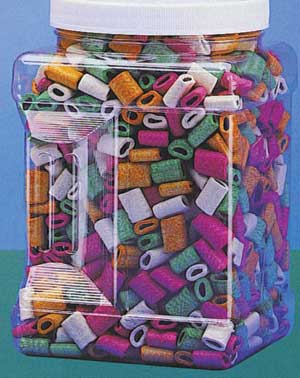
The so-called “big mouth” bulk plastic containers are shrinking all the time, and everyone from food manufacturers to club stores, grocery chains, consumers and the environment are going to benefit from this trend.
Plastic wide-mouth containers are widely used to sell bulk items such as nuts, chips, cookies, chewing gum, pretzels and toys—typically in the Big Box-type club stores. These containers are not limited to dry goods, being also used extensively to package everything from bulk size salsa to pickles in brine.
Although manufactured from the same stretch blowmolding process, these plastic containers are distinguished from the mass-produced water bottles, for example, by their “wide mouth” design for easy access and pouring.

In recent years, however, these bulk containers have been undergoing a literal “shrinking” process on multiple fronts.
At club stores, bulk container sizes are shrinking—often imperceptibly to the consumer—to maintain competitive price points, while the traditional grocery chains eager to jump into the bulk goods market are also working with manufacturers to introduce new “small bulk” sizes, down to 48-ounce capacity, to compete with the club stores.
“The new design techniques are enabling the manufacture of 15- to 25-percent lighter jars with less plastic, less cost, and greater environmental sustainability attributes,” says Jack Podnar, president of Rez-Tech Corp., Kent, Ohio-based manufacturer of PET (polyethylene terephthalate) and vinyl plastic containers.
At Podnar’s company, new packaging-specific CAD/CAM (computer-aided design/computer-aided manufacturing) software has enabled the use of significantly less plastic going into the manufacturing process due to improved jar geometry, design ribbing, design simulation, and other design techniques—maximizing the strength and performance properties required for stacking, while minimizing material costs.
The problem with traditionally-made containers, according to Podnar, is that they often tend to be “overbuilt”—thereby wasting material and capital, especially if they are not being recycled.
At club stores, bulk container sizes are shrinking to maintain price points for recession-weary consumers, who are leery to spend more but still want to have their brand-name products.
Advertisement

